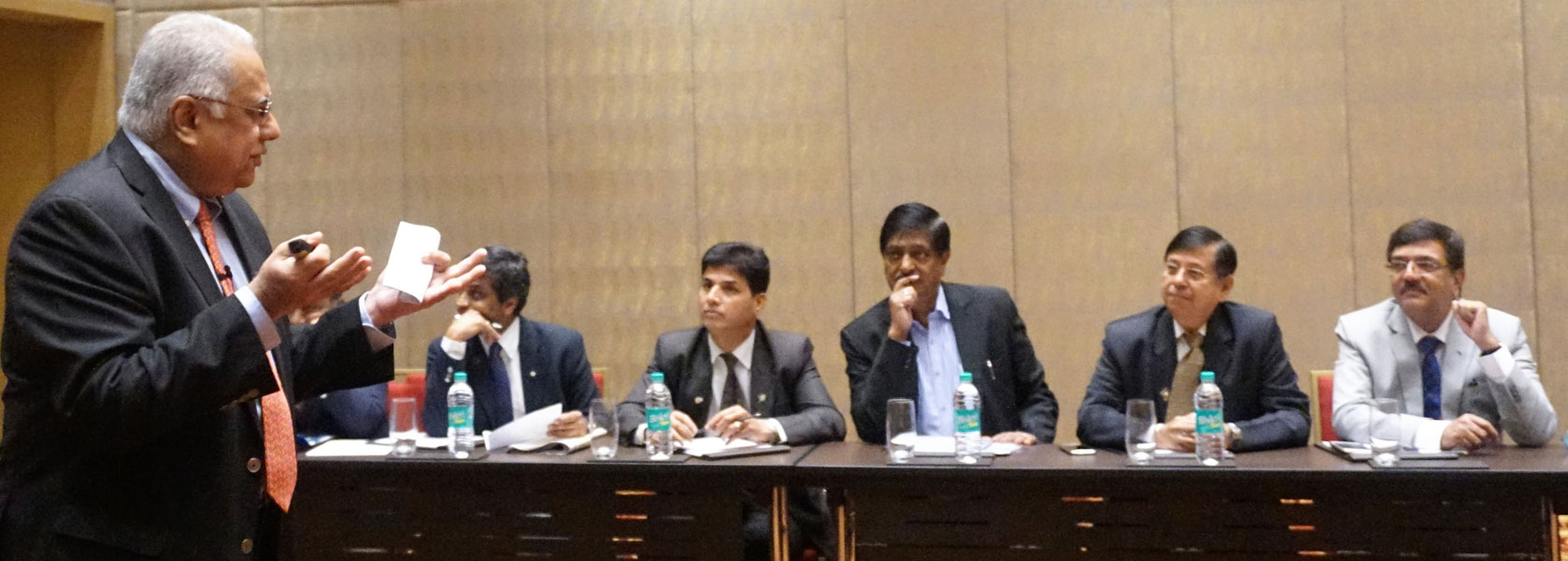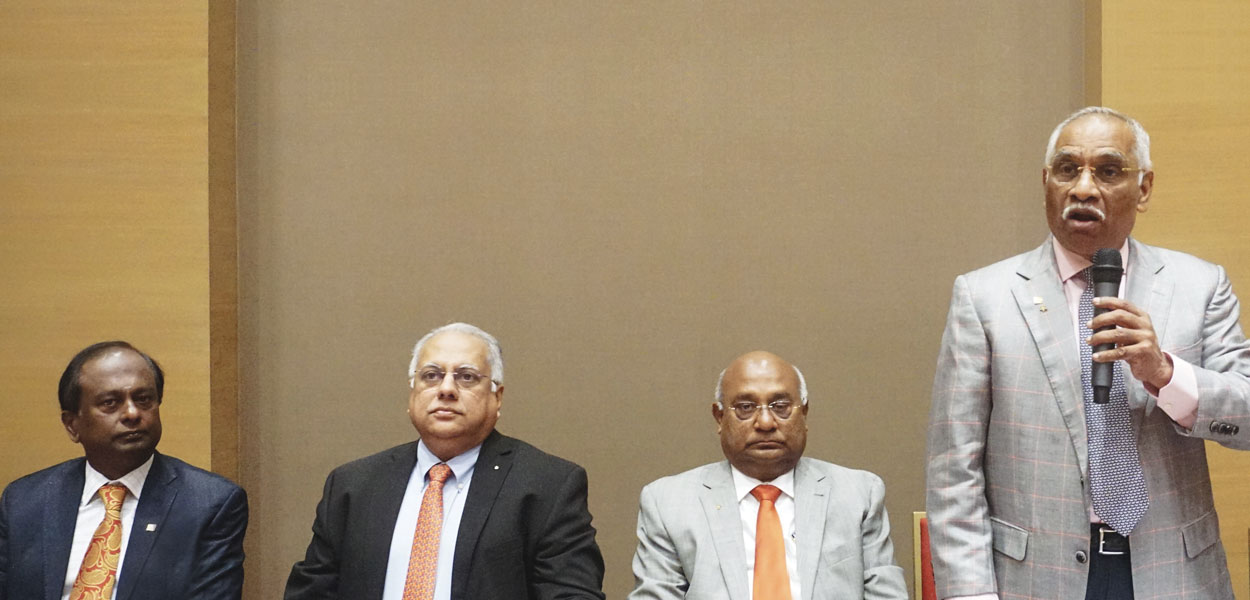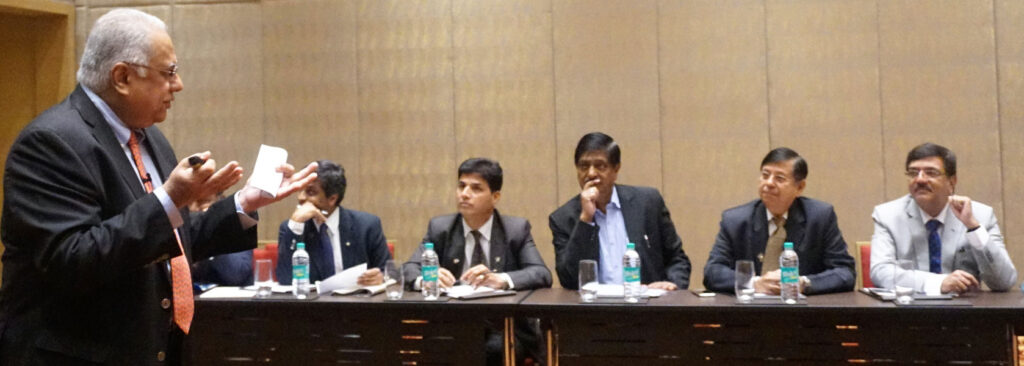

The Dubai Zone Institute is around the corner and as always, training will be an important part of it. The governors-elect, nominees and district trainers will be trained, and a governors’ mid-year review meet will be held. To train them facilitators are appointed by the conveners. For the first time ever, RI Director Manoj Desai decided to have a Facilitators’ training programme in Chennai, three months before the Institute. “The idea is to significantly improve the standards of training, and based on evaluations from earlier Institute sessions, I recommended this kind of workshop for the incoming governors to take home valuable lessons and enhance their Rotary knowledge from Zone Institutes,” said Desai.
The event was chaired by the RI Director along with RIDE C Basker, overall training chairman PDG J B Kamdar and Institute Chair V Raja Seenivasan. They were helped by Lead Facilitator PDG A S Venkatesh, Member, Lead Training Committee, Kamal Sanghvi and past training leaders Bharat Pandya, Mahesh Kotbagi and Ravi Vadlamani. “Trainers from across the country are attending this workshop to understand how to be facilitators,” said Kamdar.
Facilitators shared their presentations for the Institute in breakout sessions. Past training leaders gave guidance to improve the training and make it more interactive.
“Lesson #1, never come late for your session. As facilitators, you must be there to receive and greet the participants,” pointed out Desai, as a couple of Rotarians trooped into the hall. Talking about the art of facilitation, he said, “Ask questions and do not reveal the answers, however tempted you may be. The fundamental principle of facilitation is that the answer lies in the room. You can keep a dialogue going and make it interactive.”
A good facilitator must appreciate his audience for the right responses, draw their interest, make everyone participate. “Remember that you are training the DGEs. They will have a fair knowledge of the basics — grants, funds, etc., and their plans might be ready,” he said.
Ask questions and do not reveal the answers, however tempted you may be.
– Manoj Desai
Don’t judge their knowledge or get into uncharted territories or get too familiar with a particular person. Don’t go deep into a U-shaped seating arrangement; the trick is two steps left and two to the right so that you don’t lose eye contact with your audience. Where an issue has a mixed response, you may call for votes, were some of the tips Desai shared with the facilitators.
RI has given a set of questions from which the facilitators can choose. “Ask questions in such a way that you remove misconceptions and delegates go back learning something new,” said PDG Bharat Pandya.
A stage-managed show enacted by PDGs A S Venkatesh and Kamal Sanghvi provided insight into the finer aspects of the training such as dress code, voice modulation and dealing with awkward situations. How would you tackle a person who is constantly engaged with his phone or whose phone rings in the middle of a presentation? “Choose your words carefully so that you don’t embarrass the person. Remember you are dealing with adults who are knowledgeable in their field. Be gentle with them, like treading on glass,” said Sanghvi.
Speak slowly and clearly because there will be delegates from different parts of the Zone and not everyone will be fluent in English. Don’t overshoot your time as this will collapse the entire programme, said Venkatesh, who is one of the two lead facilitators for the 2017 International Assembly at San Diego.
He recalled an instance where he found two men carrying on a constant dialogue as he was giving a presentation. When he went up to them, he understood that one was translating the proceedings to the other who did not understand English and not chit-chatting as he had initially suspected.
Words can be misconstrued in different parts of the world. Sanghvi spoke about an occasion where he implored the delegates to take Rotary with passion and a Rotarian from the Netherlands asked him how he could relate Rotary with sex, for passion in their country meant that! This drew a recollection from Desai who said that when he spoke about PRIP Kalyan Banerjee’s theme, Reach within to ‘embrace’ humanity, some Rotarians, not conversant with the nuances of the English language, responded with a horrified ‘No’!
The mock session for the spouses was led by Sharmishtha Desai, PDG Rajyalakshmi Vadlamani and Vinita Venkatesh. “It is sort of a dress rehearsal. This is the time when we can perfect our presentations and make it better,” said Sharmishtha, encouraging the women facilitators to present their topics, and suggesting improvements.
Desai, responding to Basker’s poser on how to tell a participant to be brief in his discussion, said that the first slide for all presentations should have ground rules such as no cell phones, speak slowly and clearly and raise your hand to ask questions.
“Wear a smile. you have to be prepared for a barrage of questions. Don’t lose your cool under any situation,” advised Sanghvi while guiding PDG Ashok Panjwani through his session.
What they say…
“This exchange of ideas and sharing of thoughts helps us correct our flaws and add inputs from experts,” said Jayanthi Seenivasan, a facilitator for the spouses’ session. For Bina Desai, “the bonding that has happened now will make a difference. Otherwise we would have met there, at Dubai, a day before and it would have just been a formality and there will be no time to change the presentation.”
PDG Ajay Gupta said he learnt from this session that the facilitator’s job is to extract knowledge from the district leaders.
PDG Ratnesh Kashyap, with 30 years of training experience in Jaycees and Rotary, said, “A facilitator’s job is not about giving your knowledge to the participants; rather, it is an art to extract the answers from them. We are not trainers; we are ‘facilitating’ to bring out the best in them. They are already established leaders and their knowledge has to be honed.”
The art of facilitating is truly amazing and it was a great day that all facilitators picked up the art. Let’s look forward to a great meet at Dubai, he added.
Pictures by Jaishree






